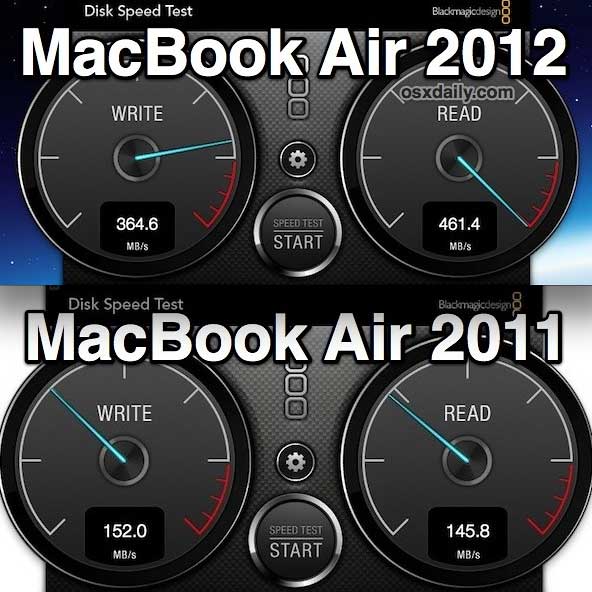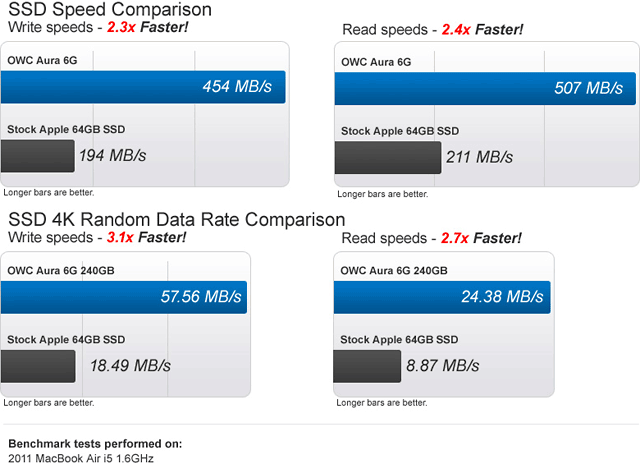Sometimes the math geek – which can always be a bit anal about numbers and how they’re presented – wonders why a particular headline isn’t a bit better. For instance, Cult of Mac published The SSD in the New MacBook Air Is 217% Faster than Before on Tuesday, which makes it sound like SSD performance in the Mid 2012 MacBook Air (MBA) is a bit over twice as fast as in the Mid 2011 MacBook Air.
In reading the article, which cites test results published by OSXDaily, I learned that the Toshiba SSD in the tested Mid 2012 model scores 364.6 MB/s on writes, while last year’s model achieves only 152.0 MB/s – 2.3987x times the performance! Even better, where the 2011 MBA could read data from its SSD at 145.8 MB/s, the Mid 2012 MBA scores an impressive 461.4 MB/s – 3.1646 times as fast.

SSD benchmark results as posted by OSXDaily.
In other words, the headline, while technically accurate (“217% faster” means exactly the same thing as “3.17 times as fast”), doesn’t do enough to convey the huge increase in performance. If we’d run that article on Low End Mac, the headline would have read “SSD in 2012 MacBook Air Over Twice as Fast as Last Year’s” – which would actually be underselling the over 3x as fast reads. To really draw in traffic, “SSD in 2012 MacBook Air Reads Over 3x as Fast as Last Year’s” would be the headline, but I prefer to keep headlines as simple as possible while also as long as necessary.
Reads are the more important of the two numbers, as that’s what determines how fast you Mac boots, loads apps, and opens documents. Writes are important, but less so, because you probably spend less time saving files than booting your Mac, launching apps, and opening documents.
The other time write speed is important is when your Mac is using scratch space on the hard drive, as it does with virtual memory, some apps do when working with huge files, and MacBooks (and Mac minis) tend to do at shut down, when their default behavior is to write the full contents of system memory to your hard drive or SSD (see our Safe Sleep FAQ for details).
Why Is It Faster?
Why is the 2012 MBA’s SSD so much faster than last year’s? Two reasons:
- The Mid 2012 models uses 6 Gb/s SATA Revision 3 SSDs vs. 3 Gb/s SATA Revision 2 SSDs in the 2011 machines.
- The tested SSD use SandForce controllers, which are generally considered the fastest.
Other World Computing (OWC) has been shipping SandForce-based SSDs for some time and began to ship 6 Gb/s SSDs for the 2011 MacBook Airs late last year, unleashing the full potential of its SATA Revision 3 bus. (The 2010 MacBook Air uses the same SSD connector as the 2011, but its chipset only supports 3 Gb/s SATA Revision 2.)
For those already using a 2011 MBA who want a faster SSD, OWC sells 6G SSDs for $200 (120 GB) to $795 (480 GB), so you don’t have to buy a 2012 MBA to have a faster drive. (That said, the 2012 models also have improved graphics, slightly faster CPUs, and USB 3.0, which is a world faster than USB 2.0.)
At this point, I have to call OWC on the carpet for reporting performance results going from Apple’s 2011 SSD to OWC’s 6G SSD as 2.3, 2.4, 3.1, and 2.7 times faster when they are in fact 2.3, 2.4, 3.1, and 2.7 times as fast.

Other World Computing reports its 6G SSDs as times faster rather than times as fast.
As I said at the beginning of this article, sometimes the math geek in me gets a bit anal about how numbers are presented. And it’s not that people don’t understand what OWC is claiming, only that it’s not technically correct. OWC makes wonderful products, does a great job supporting older Macs, and also gives you the hard facts of SSD performance in addition to the “x faster” claim. We love OWC and are its customers. I just get a bit anal about technical correctness sometimes.
Keywords: #fasterthan #timesasfast
Short link: http://goo.gl/C04daU
searchwords: fasterthan, timesasfast

